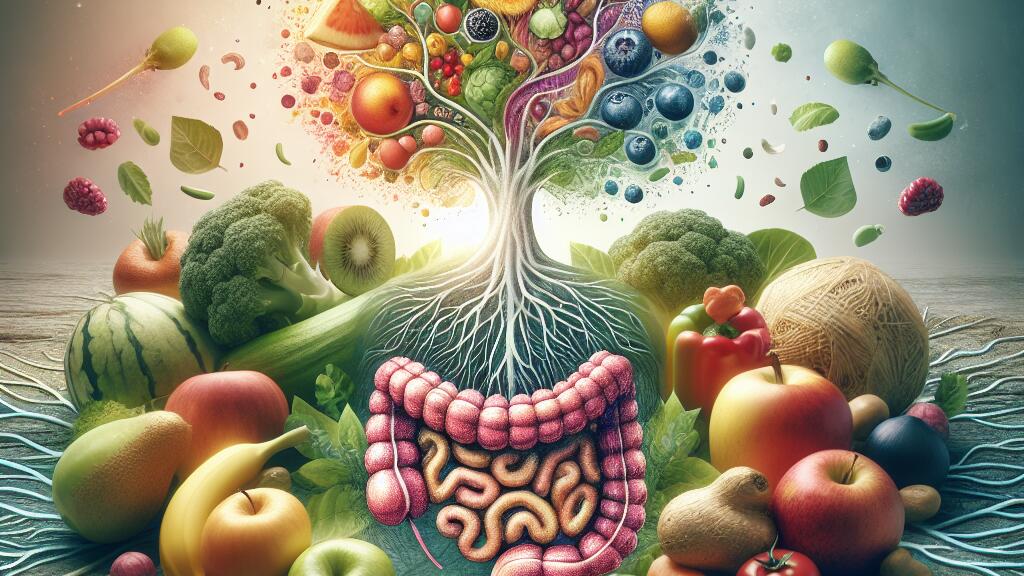Plant Based Diet and Gut Health
Table Of Contents
Plant Based Diet And Gut Health | The Connection Between a Plant-Based Diet and Gut Health
Key Takeaways
- Insights into plant-centered eating and digestive wellness
- Connection between plant-centered eating and intestinal health
- Essential elements of a plant-centered diet
- Possible health advantages of plant-centered diets for digestive wellness
- Suggestions for shifting to a plant-centered diet
- Frequent misconceptions regarding plant-centered diets
- Useful recipes for a digestive-friendly plant-centered diet
Plant Based Diet And Gut Health | Understanding PlantBased Diets
Understanding the intricate relationship between Plant Based Diet and Gut Health begins with a clear definition of what constitutes a plant-based diet. A plant-based diet primarily focuses on plant foods, emphasizing whole, minimally processed options such as fruits, vegetables, grains, legumes, nuts, and seeds. These plant-based foods are rich in essential nutrients and fiber, creating a supportive environment for gut microbiota. The adoption of plant-based diets has been linked to various health benefits, owing to the diverse array of plant foods that nourish both the body and the gut. By centering meals around these plant-rich foods, individuals can enhance their gut health, making it vital to explore the defining aspects and advantages of a plant-based diet.
Plant Based Diet and Gut Health | Definition of a PlantBased Diet
A plant-based diet emphasizes the consumption of natural foods derived primarily from plants. This encompasses a wide variety of diet foods, including fruits, vegetables, whole grains, legumes, nuts, and seeds. Unlike the typical western diet, which is often high in processed foods and animal products, a vegetarian diet focuses on whole, minimally processed options. This shift towards healthier diets not only supports individual preferences but also promotes gut health by providing the necessary nutrients and fiber.
The relationship between a plant-based diet and gut health is becoming increasingly recognized in dietary research. A well-planned diet rich in plant foods can enhance the diversity of gut microbiota, which is essential for overall digestive health. By prioritizing these natural foods, individuals can experience significant improvements in their gut health. The consumption of a variety of plant-based diets encourages a balanced intake of dietary fiber, essential for maintaining a healthy gut environment.
Overview of Different PlantBased Diets
Plant-based diets encompass a variety of eating patterns that prioritize natural food sources derived from plants. These include vegetarian diets, where animal products are excluded, and vegan diets, which eliminate all animal-derived foods. Each type of plant-based lifestyle offers unique food nutrients that can positively impact gut health. For instance, a high fiber diet abundant in fruits, vegetables, legumes, and whole grains supports the gut microbiome, enhancing digestion and overall wellbeing.
Some individuals choose a raw vegan diet, consuming only uncooked plant foods, while others may adopt a more flexible approach that includes the occasional high-fat diet with plant-based fats. Many dietitians advocate for these diets due to their potential health benefits. Emphasizing whole foods over processed options can lead to enhanced nutrient intake, bolstering the connection between a Plant Based Diet and Gut Health. Understanding the diversity within plant-based diets is crucial for those seeking to improve their gut health through dietary choices.
The Link Between PlantBased Diets and Gut Health
A well-structured understanding of the relationship between a Plant Based Diet and Gut Health reveals significant insights into how dietary choices impact gut microbiota. High-fiber diets, rich in plant-based foods, promote a diverse community of gut microbes, which are essential for optimal digestion. Transitioning to a semi-vegetarian diet or incorporating more vegetarian foods can enhance the intake of dietary fiber while reducing reliance on low fiber diets. This shift may also include plant-based meat alternatives, which offer high carbohydrate content while maintaining fiber levels. Emphasizing dietary fibers from fruits, vegetables, and legumes can lead to improved gut health and overall well-being, showcasing the profound connection between a Plant Based Diet and Gut Health.
| Plant-Based Food | Type of Fiber | Gut Health Benefits |
|---|---|---|
| Fruits (e.g., apples, bananas) | Soluble Fiber | Helps to lower cholesterol and regulate blood sugar levels |
| Vegetables (e.g., broccoli, carrots) | Insoluble Fiber | Promotes regular bowel movements and supports digestive health |
| Legumes (e.g., lentils, chickpeas) | Soluble and Insoluble Fiber | Supports a healthy gut microbiome and aids in digestion |
| Whole Grains (e.g., oats, quinoa) | Both Types of Fiber | Provides sustained energy and promotes satiety |
| Nuts and Seeds (e.g., chia seeds, almonds) | Insoluble Fiber | Supports gut health and provides essential fatty acids |
How PlantBased Foods Influence Gut Microbiota
A Plant Based Diet and Gut Health are closely linked through the impact of food intake on human gut microbiota. Dietetics emphasizes the importance of whole foods in maintaining a diverse gut microbiome. Foods sourced from a strictly vegan diet typically offer higher fiber content, which is beneficial for digestion. A higher fiber diet, common in vegan diets and the Mediterranean diet, encourages the growth of beneficial bacteria in the gut, leading to improved overall gut health.
The gut microbiome thrives on various plant-based foods that are rich in nutrients and fiber. By incorporating a variety of fruits, vegetables, legumes, and whole grains, individuals can significantly influence their gut health positively. Diverse food intake not only supports the balance of gut microbiota but also enhances the body’s ability to absorb essential nutrients. Understanding the relationship between a Plant Based Diet and Gut Health can motivate individuals to embrace more plant-based choices for better well-being.
Benefits of a Healthy Gut
A healthy gut plays a crucial role in overall well-being and is significantly influenced by our eating habits. Plant-based diets positively affect gut health by providing a rich source of dietary fiber, essential for maintaining gut flora balance. Those eating a diet rich in whole plant foods have more diversity in gut bacteria, which is vital for digestive health. The nutrients in plant-focused diets, such as vitamins and antioxidants, support a thriving gut environment, contributing to improved immune function and reduced inflammation.
Adopting plant-based diets increases beneficial bacteria in our gut, which can lead to better digestion and nutrient absorption. A plant-forward diet avoids processed foods that may disrupt gut microbiota balance. Plant-based dietary patterns emphasize the consumption of fruits, vegetables, legumes, and whole grains, all of which enhance gut health. Embracing a plant-based eating approach allows individuals to reap the rewards of a healthier gut and, consequently, a healthier body.
Key Components of a PlantBased Diet
A plant-based diet that emphasizes whole plant foods serves as a foundation for improving gut health. Such a diet provides adequate nutrients that support a healthy gut, fostering the growth of beneficial gut bacteria. Unlike a conventional diet, which may include processed foods, a plant-based diet focuses on natural ingredients, allowing the body’s microbiome to flourish. This focus on plant foods not only enhances digestion but also promotes overall well-being. As a well-structured diet plan prioritizes fiber-rich options, it significantly impacts gut health—and consequently, the benefits extend beyond digestion. Embracing this approach allows individuals to experience the profound link between a plant-based diet and gut health.
Whole Foods vs. Processed Foods
Choosing high-quality plant foods is essential for optimal gut health within a plant-based diet. Many plant foods, such as fruits, vegetables, whole grains, nuts, and seeds, provide vital nutrients and fiber that promote a healthy gut microbiome. By incorporating different plant foods into your entire diet, you’re not only enhancing your nutritional intake but also supporting the diversity of gut bacteria. This diversity can be especially important for those transitioning from conventional diets or animal-based diets, as it helps to establish a balanced internal ecosystem conducive to overall gut health.
Processed foods, on the other hand, often lack the beneficial components found in whole, plant-based food items. These foods may contain additives, preservatives, and high levels of sugar or unhealthy fats, which can negatively impact digestion and gut flora. For those following particular diets, like a plant-based approach, it’s crucial to prioritize whole foods over processed plant-based snack options. By doing so, you can help ensure that your meals not only taste great but also contribute significantly to your gut health and well-being.
Importance of Fiber in PlantBased Diets
Fiber plays a crucial role in a Plant Based Diet and Gut Health. It is primarily composed of dietary plant polysaccharides that act as a prebiotic, fostering the growth of beneficial gut bacteria. Certain diets rich in fiber, such as the Indian diet, have been shown to reduce the risk of various gastrointestinal disorders. Incorporating high-fiber foods improves overall digestion and enhances the gut microbiome, contributing to optimal gut health. Different diets can influence fiber intake, making it essential to understand how to incorporate various sources into new dietary habits.
The diet health benefits of fiber extend beyond digestion. A well-balanced plant-based diet, which emphasizes whole grains, fruits, and vegetables, promotes healthier bowel movements and helps regulate blood sugar levels. Studies indicate that higher fiber intake is linked to lower rates of chronic diseases, further solidifying its importance in different diets. Transitioning to a new diet featuring diverse fiber sources can significantly improve one’s overall well-being and support Plant Based Diet and Gut Health effectively.
- Aids in maintaining a healthy weight by promoting satiety.
- Helps lower cholesterol levels, reducing the risk of heart disease.
- Supports healthy blood sugar control, beneficial for diabetes management.
- Promotes regular bowel movements and prevents constipation.
- Fosters a diverse gut microbiome, which is essential for overall health.
- May lower the risk of certain cancers, such as colorectal cancer.
- Assists in detoxification by helping to eliminate waste from the body.
Potential Health Benefits of PlantBased Diets for Gut Health
Research has shown that a well-structured plant-based diet can significantly enhance gut health, providing benefits that often surpass those associated with an omnivore diet. The shift in dietary composition when adopting a plant-based diet can influence the diversity and functionality of the gut microbiome, leading to the promotion of a healthy gut microbiome. Numerous diet reviews highlight that dietary components such as fiber, antioxidants, and phytochemicals found in plant foods contribute to improved digestive processes. Many diet consumers are increasingly recognizing these advantages, as studies from sources like gutmicrobiotaforhealth.com continue to support the positive links between plant-based diets and overall gut wellness. Understanding these diet subjects is essential for those looking to optimize their health through informed dietary patterns.
- A plant-based diet is rich in fiber, which aids in digestion and promotes regular bowel movements.
- Increased consumption of fruits and vegetables can enhance the diversity of gut bacteria.
- Antioxidants found in plant foods may help reduce inflammation within the gut.
- Phytochemicals can support the growth of beneficial gut bacteria.
- Plant-based diets are often lower in saturated fats, contributing to better gut health.
- Regular intake of legumes and whole grains can improve gut motility and health.
- A diverse microbiome is linked to a stronger immune system and better overall health.
Disease Prevention and Gut Health
Research indicates that a Plant Based Diet and Gut Health are closely linked, especially in the context of disease prevention. Increased vegetable intake often associated with vegetarian intervention diets can lead to significant improvements in gut microbiota composition. These dietary changes, especially when moving away from westernized diets rich in processed foods, promote the growth of health-boosting gut microbes. This shift not only enhances gut physiology but may also reduce the risk of chronic diseases.
Transitioning to a plant-based approach encourages diverse consumption of different food nutrients, which is essential for nurturing a healthy gut. While omnivorous diets may provide some benefits, the unique blend of fibers, antioxidants, and phytochemicals in a Plant Based Diet actively supports gut health. Such diet interventions can effectively alter gut microbiota, offering protective effects against various health issues. Emphasizing a focus on whole, plant-based foods fosters a more resilient and diverse microbiome, benefiting overall health.
Impact on Digestion and Overall Wellbeing
A Plant Based Diet and Gut Health significantly contribute to improved digestion and overall well-being. Different gut microbiota thrive on varied dietary categories, where plant-based foods enhance the gut microbiota ecosystem. Unlike omnivorous diets or meat-based diets, vegetarian and vegan diets increase the diversity of gut microbes. These changes lead to a more resilient gut microbiota that can positively influence various physiological processes. Diet manipulation through specific dietary changes often results in beneficial gut health outcomes.
Transitioning to a Plant Based Diet and Gut Health can also alleviate common digestive issues. Research shows that a diet intervention focusing on plant-based foods leads to more efficient digestion, reducing symptoms like bloating and discomfort often associated with meat-heavy diets. The dietary change fosters a balanced interaction between the diet and host, which is crucial for maintaining gut health. Emphasizing high-fiber plant foods supports this relationship, ensuring a flourishing gut microbiota and enhanced overall well-being.
Tips for Transitioning to a PlantBased Diet
Transitioning to a plant-based diet can significantly enhance both personal health and gut microbiota. Focusing on a fiber-rich diet contributes to a thriving community of beneficial gut bugs, which protects the gut microbiota. By reducing animal-based foods, individuals can improve their dietary intake of vegetables, which are known to promote gut health. Many diets emphasize the importance of whole, unprocessed foods, thus a low-fat vegan diet may serve as a sustainable option. Prioritizing vegetable consumption while gradually decreasing a meat diet can lead to a positive dietary impact on overall wellness and digestive health. The connection between a plant-based diet and gut health becomes increasingly evident as individuals observe improvements in their digestion and well-being.
Starting Gradually
Transitioning to a Plant Based Diet and Gut Health can be made easier by starting gradually. This approach allows individuals to adjust their gut lining to accommodate the increased fiber-enriched diets typically found in plant foods. Incorporating more plant-based recipes, such as meals featuring bananas or legumes, can help in developing a taste for a vegan or vegetarian diet. Gradually reducing meat-based diets while increasing the intake of dietary fiber can significantly enhance normal gut microbiota, promoting a healthy balance of specific gut microbes.
Focusing on small changes can pave the way for a sustainable shift towards a more plant-centric lifestyle. Each meal can be an opportunity to boost legume intake and diversify fiber consumption. Simple substitutions like replacing one or two animal-based meals with plant-based options can lead to improved Plant Based Diet and Gut Health. This step-by-step method not only eases the transition but also allows individuals to notice positive changes in their digestive health over time.
Meal Planning for Optimal Gut Health
Effective meal planning is essential for maximizing the benefits of a Plant Based Diet and Gut Health. Incorporating diverse plant foods fosters a flourishing gut microbiome, which can significantly enhance gut microbiota changes. Emphasizing vegetarian or vegan diets, adhering to the Eat-Lancet reference diet, and exploring dietary interventions can promote a varied gut microbiome. For those considering a Chinese diet or similar approaches, it’s beneficial to include a range of whole foods to ensure a robust mix of nutrients that nourish gut health.
Creating well-rounded meals involves selecting ingredients that support a healthy digestive system. Prioritize foods that are high in fiber, such as whole grains and legumes, which are known to contribute to a diverse gut microbiome. Planning meals that feature an array of colorful vegetables not only adds variety to your menu but also helps in cultivating an optimal environment for beneficial bacteria. By focusing on these aspects, individuals can align their plant-based eating habits with the principles of gut microbiota—not just vegetarian eating—thereby enhancing their overall gut health.
Common Myths About PlantBased Diets
Misconceptions surrounding a Plant Based Diet and Gut Health often center around protein intake and nutrient deficiencies. Many believe that individuals within this diet group cannot meet their nutritional needs due to a lack of animal products. However, ample plant products, rich in dietary polysaccharides, can significantly contribute to a healthy gut profile. Increased vegetable consumption reduces the risk of gut-related ailments by promoting the growth of friendly gut bacteria. Research indicates that well-planned vegan or vegetarian diets can effectively serve as a dietary intervention, enhancing the leading gut microbiome and overall well-being. Emphasizing diverse nutrient contents in plant-based foods ensures adequate intake to support digestive health.
Misconceptions Related to Protein Intake
Many people believe that a plant-based diet does not provide sufficient protein for optimal health. This misunderstanding often overlooks the rich sources of protein found in legumes, nuts, seeds, and whole grains. These plant-based foods not only support muscle maintenance but also positively influence gut health by promoting the balance of gut communities. A well-structured plant-based diet fosters gut homeostasis and the integrity of the gut mucosa, making it an excellent choice for overall wellness.
The nutritional impact of a plant-based diet extends beyond protein content. Adequate consumption of dietary fiber is crucial for maintaining healthy gut environments. High-fiber foods enhance digestion, support diverse gut microbiota, and help regulate gut mucosa function. A plant-based food-reliant diet equips individuals with various nutrients necessary for sustaining gut health, countering the notion that protein intake is compromised in this dietary approach.
The Truth About Nutrient Deficiencies
Nutrient deficiencies are often a concern for those considering a Plant Based Diet and Gut Health. It’s essential to focus on a nutritional target that supports both well-being and the diversity of gut bugs present in the human gut bacteria. Personalized nutrition can help individuals understand how to adequately feed their gut microbiome, ensuring optimal plant-based protein absorption. Regular nutrition updates and advice can dispel myths surrounding nutrient deficiencies, highlighting that a well-planned plant-based diet can provide essential vitamins and minerals.
Long-term diets based on whole foods can mitigate the risk of nutrient deficiencies often associated with plant-based eating. Public health nutrition emphasizes the importance of variety and balance in these diets to support robust gut health. By choosing diverse foods, individuals can enhance their nutrient intake while also benefiting their gut bugs. This awareness can empower those pursuing a Plant Based Diet and Gut Health to make informed choices that safeguard their nutritional status.
Practical Recipes for a GutFriendly PlantBased Diet
Recipes for a gut-friendly approach within a Plant-Based Diet and Gut Health framework can greatly influence overall well-being. Emphasizing the use of different vegetables enhances the diversity of the gut microbiome breakdown, promoting a healthier gut environment. Incorporating options like plant-based mayo can help satisfy cravings while maintaining a focus on gut health. A lactovegetarian diet offers another avenue for diet adoption, creating a balance that supports the diet-host interaction essential for nutrient absorption. Utilizing nutrition services to create meal plans rich in diet-dependent metabolites can further address gut-related issues and combat obesity-related microbiota imbalances. Focusing on these elements can lead to a more robust gut health strategy.
Breakfast Ideas Rich in Fiber
A nutritious breakfast can set the tone for a day that supports Plant Based Diet and Gut Health. Incorporating plant-based protein sources like chia seeds or oatmeal not only boosts nutrient delivery but also enhances dietary fiber fermentation within the gut. A nutty tempeh salad served alongside whole grain toast offers a delicious and filling option that promotes a diverse gut microbial environment. Such meals contribute positively to intestinal microbiota composition, making them ideal for those aiming to improve gut health through their dietary choices.
Focusing on high-fiber breakfast options can help modulate diet-induced obesity while significantly enhancing nutrient bioavailability. Overnight oats topped with fresh fruits and nuts provide ample fiber and essential nutrients, ensuring long-term dietary patterns support gut health. By prioritizing such foods in the morning, the benefits extend beyond taste and satisfaction, fostering improved digestive health and a balanced microbiome. Embracing these breakfast ideas will facilitate a strong foundation for anyone exploring the relationship between Plant Based Diet and Gut Health.
Lunch and Dinner Options for Digestive Health
Exploring various lunch and dinner options can enhance your Plant Based Diet and Gut Health. Incorporating dishes rich in dietary plant polysaccharides, such as lentil soups and chickpea salads, supports optimal gut health. Different diets that emphasize whole foods contribute significantly to gut microbiota balance. Following an Indian diet can also provide unique spices and flavors while promoting dietary habits that reduce inflammation and improve digestion.
A new diet focusing on legumes, whole grains, and fresh vegetables offers substantial diet health benefits. These diet types influence the gut’s ecosystem, fostering diversity within the microbiome. For example, dishes like quinoa bowls topped with roasted veggies and tahini dressing not only taste great but also align perfectly with the principles of a plant-based approach. Embracing these nutritious options can lead to improved overall well-being and a happier digestive system.
| Dish | Main Ingredients | Health Benefits |
|---|---|---|
| Lentil Soup | Lentils, carrots, celery, onions, garlic | High in fiber, supports gut health and digestion |
| Chickpea Salad | Chickpeas, cucumbers, tomatoes, red onion, olive oil | Rich in protein and fiber, promotes gut microbiota balance |
| Quinoa Bowl | Quinoa, roasted vegetables, tahini dressing | Provides essential nutrients, anti-inflammatory properties |
| Stir-Fried Vegetables | Broccoli, bell peppers, carrots, tofu | Packed with vitamins, improves digestive health |
Conclusion
The relationship between a Plant Based Diet and Gut Health highlights the importance of incorporating diverse plant-based protein sources into daily meals. For example, a nutty tempeh salad not only provides protein but also supports the modulation of intestinal microbiota composition. This dietary approach enhances the diverse gut microbial ecosystem, promoting effective dietary fiber fermentation. Long-term dietary patterns rooted in plant foods can improve nutrient delivery and increase nutrient bioavailability. Such shifts in eating habits may also mitigate the risks associated with diet-induced obesity while fostering overall gut health. Emphasizing the synergy between a Plant Based Diet and Gut Health can lead to significant health benefits and improved well-being.
FAQS
How can a plant-based diet enhance gut health compared to other diets?
A plant-based diet can greatly enhance gut health by incorporating a variety of plant foods that provide adequate dietary fiber consumption, which is essential for promoting good gut health. Such diets, including vegetarian/vegan diets, are rich in plant-based foods that support the growth of beneficial gut microbiota. Moreover, a plant-rich diet helps maintain overall gut health by avoiding processed foods and focusing on food sourced from whole ingredients. This dietary approach not only reduces the risk of gut-related issues but also aids in achieving a high carbohydrate diet that fuels healthy diets necessary for a balanced human diet.
What are the key benefits of plant-based diets for maintaining gut health?
Plant-based diets offer numerous benefits for gut health, as they promote the inclusion of various plant-based foods rich in dietary fiber. This can lead to a healthier gut microbiota, which plays a critical role in overall gut health. Additionally, plant-based diets avoid processed ingredients and unhealthy fats, ensuring that the diet provides adequate nutrition. Studies suggest that a vegan/vegetarian diet can lead to gut health improvements, as these plant-based lifestyles modulate diet–host interactions favorably. Therefore, adopting a plant-based diet, such as the Eat-Lancet reference diet, can reduce inflammation and support the growth of beneficial gut bacteria.
What specific plant-based foods contribute to improved gut health, and how do plant-based diets avoid common gut health issues?
Plant-based diets, rich in dietary fiber, include various plant foods–bananas, legumes, and whole grains, which promote overall gut health. These diets provide adequate nutrition while avoiding animal products, which can sometimes disrupt gut microbiota. As a result, gut health grows and flourishes, while a properly balanced plant-based diet reduces the risk of gut-related issues and supports the body’s nutritional needs. Information from nutrition advice and research like the Lancet reference diet supports the benefits of vegan/vegetarian diets in modulating gut health.
How do plant-based diets affect overall gut health and what dietary fiber is included in these diets to support gut microbiota?
Plant-based diets have a significant positive impact on overall gut health by providing adequate dietary fiber, which helps in modulating gut microbiota. Foods rich in dietary fiber, often found in plant-based foods, protect gut health and enable the gut to function optimally. Research like the Eat-Lancet reference diet supports the notion that these diets not only avoid common gut health issues but also enhance overall nutrition, contributing to a healthier gastrointestinal system.
How do plant-based diets contribute to overall gut health and what role do plant based foods play in this process?
Plant-based diets significantly contribute to overall gut health due to the inclusion of a variety of plant based foods that are rich in dietary fiber. These foods not only provide adequate nutrition but also help in the modulation of gut microbiota. Studies indicate that a well-balanced plant-based diet protects the gut, as it avoids certain common issues that can arise from less fiber-rich diets. The eat–lancet reference diet exemplifies how a plant-based approach can be aligned with nutrition business goals while promoting gut wellness.
How do different plant-based diets influence gut microbiota and what dietary fiber do they provide to enhance overall gut health?
Various plant-based diets significantly contribute to overall gut health as they provide adequate dietary fiber, which plays a critical role in modulating gut microbiota. These plant-based diets avoid common gut issues by incorporating a variety of foods that protect and support gut microbiota, ensuring that the diet brings about beneficial changes to gut health.
How do plant-based diets help in diet modulation and what dietary fiber benefits do they provide for overall gut health?
Plant-based diets are known for their ability to promote diet modulation, as they incorporate a variety of foods that can enhance overall gut health. These diets provide adequate dietary fiber, which is essential for nurturing gut microbiota. Additionally, a plant-based diet protects gut health by preventing issues commonly associated with low fiber intake, ensuring the gut remains healthy and functioning optimally.
What measures can be taken by individuals adhering to plant-based diets to ensure they are providing adequate dietary fiber for gut health?
Individuals following plant-based diets should focus on incorporating a variety of whole grains, legumes, fruits, and vegetables into their meals. These foods not only enhance overall gut health but also ensure that the diet provides adequate dietary fiber, which is essential in supporting gut microbiota. Additionally, a well-planned plant-based diet avoids common pitfalls that can negatively affect gut health, ensuring that it promotes a balanced and diverse gut microbiome.
What measures can one take to ensure that a plant-based diet provides adequate dietary fiber for supporting overall gut health?
To ensure that a plant-based diet provides adequate dietary fiber for supporting overall gut health, individuals should include a variety of whole grains, legumes, fruits, and vegetables in their meals. Such foods not only supply essential nutrients but also help maintain a healthy gut microbiota. Moreover, a well-planned plant-based diet avoids processed foods, which can hinder gut health, ensuring that the individual’s dietary choices contribute positively to their overall gut health and well-being.
What are some common misconceptions about how plant-based diets support overall gut health and avoid issues related to gut microbiota?
Many people believe that plant-based diets do not provide adequate dietary fiber for gut health, but this is a misconception as plant-based diets are rich in fiber, which supports gut microbiota. A well-planned plant-based diet provides adequate nutrients that promote overall gut health, and research indicates that such a diet protects gut health by maintaining a diverse microbiome and avoiding common gut issues.






